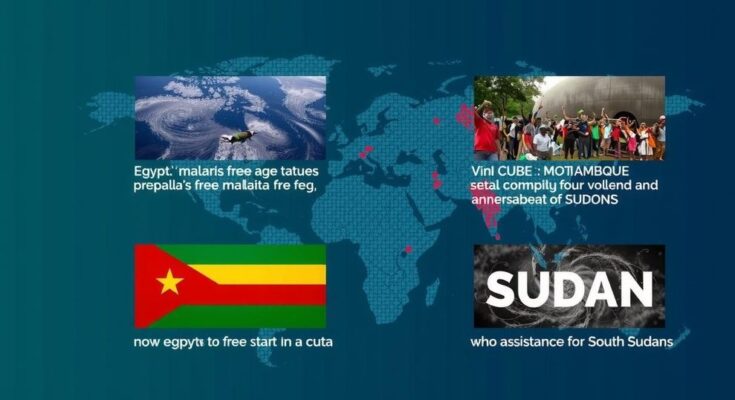This article reports on notable global news: Egypt has been certified malaria-free by the WHO, marking a significant milestone in health. In Cuba, a power crisis worsened by Tropical Storm Oscar affects millions. In Mozambique, the UN calls for calm after opposition figure killings. Lastly, South Sudan requires urgent assistance amid severe flooding affecting hundreds of thousands.
In a significant global health achievement, the World Health Organization (WHO) has officially recognized Egypt as malaria-free, a designation reflecting over a century of concerted efforts to eliminate this ancient disease from the region. This success story is particularly notable given Egypt’s population of over 100 million, showcasing the nation’s commitment and the efficacy of health interventions. WHO Director-General Dr. Tedros Adhanom-Ghebreyesus stated, “Malaria is as old as Egyptian civilization itself, but the disease that plagued pharaohs now belongs to its history and not its future. This certification of Egypt as malaria-free is truly historic, and a testament to the commitment of the people and Government of Egypt to rid themselves of this ancient scourge.” With this designation, Egypt becomes the third country in the WHO’s Eastern Mediterranean region to achieve this milestone, joining the United Arab Emirates and Morocco on a list of 44 nations globally that have eradicated malaria. Dr. Tedros applauded Egypt’s accomplishment as an inspiring example for other countries grappling with similar health challenges. In Cuba, the United Nations is mobilizing support amid widespread power outages affecting approximately 10 million people, exacerbated by Tropical Storm Oscar’s impact. The storm not only threatens to worsen the situation with potential flooding but also continues to underscore the infrastructure challenges faced by the Cuban government, rooted in fuel shortages and exacerbated by longstanding economic sanctions. UN Deputy Spokesperson Farhan Haq commented on the ongoing crisis, indicating that, “The strong but slow-moving storm has generated significant rainfall… and will compound the situation with more rainfall and potential flooding in the coming hours.” In Mozambique, UN Secretary-General António Guterres has called for calm following the tragic killings of two opposition political figures amid electoral disputes. He urged authorities to promptly investigate these murders to ensure justice is served while encouraging Mozambicans to maintain peace as they await official electoral outcomes. Guterres reaffirmed the UN’s commitment to supporting stability and peace within the country during this tumultuous period. Finally, in South Sudan, the WHO is responding to severe flooding that has affected nearly 890,000 individuals across the nation. The floods, exacerbated by climate change, have led to a humanitarian crisis, displacing over 226,000 people and impacting healthcare infrastructure. The WHO has provided emergency health kits to assist those affected, which can effectively treat over 870,000 individuals for conditions exacerbated by the floods, such as cholera and malaria.
The reported events highlight critical global health achievements and humanitarian crises occurring worldwide. Egypt’s certification as malaria-free marks an important milestone not just for the nation but for global health initiatives targeting malaria eradication. The situation in Cuba illustrates the ongoing challenges of infrastructure failures in the face of natural disasters, while Mozambique’s political tensions underscore the fragility of peace in regions with contentious electoral processes. Lastly, South Sudan’s struggle with flooding emphasizes the intersection of climate change and humanitarian needs, demonstrating the urgent need for international health support.
In summary, this report underscores significant developments across different nations: Egypt has realized a historic milestone in malaria eradication, Cuba faces severe humanitarian challenges due to tropical weather systems, Mozambique is grappling with political unrest following violent incidents, and South Sudan requires urgent assistance due to severe flooding. The global community remains engaged in supporting these regions, showcasing the ongoing challenges and successes within public health and governance.
Original Source: news.un.org




